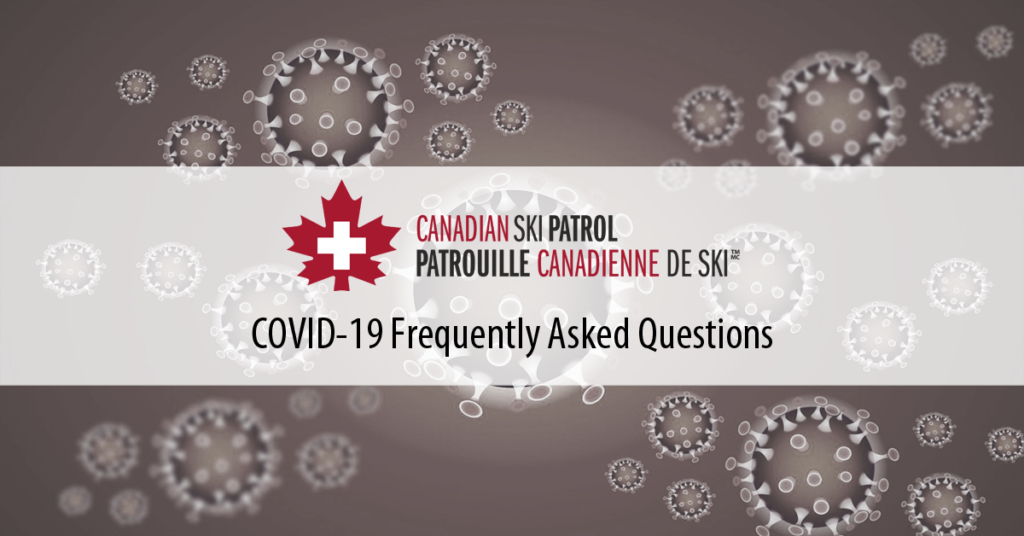
March 13, 2020
Prepared by: Ted Findlay, DO, CCFP, FCFP
Chair, Medical Advisors Committee, CSP
As first responders, CSP members need to stay informed on the evolving picture of the COVID-19 viral outbreak. While the risk to the public and patrollers at ski resorts and outdoor functions is not believed to be higher than public gatherings for any other reason, CSP members need to be aware of recommended measures for risk reduction. While there are many sources of information, it will be important to identify those that are accurate, reliable, current and provide provincial and national recommendations.
What is COVID-19?
COVID-19 is the name of a coronavirus disease caused by the SARS-CoV-2 virus, which was first identified as responsible for a public outbreak in the city of Wuhan, China towards the end of 2019. There has been subsequent spread to more than 80 countries including Canada and the United States.
Human coronaviruses are common and are typically associated with mild illnesses, similar to the common cold. Symptoms of human coronaviruses may be very mild or more serious, such as:
- Fever
- Cough
- Difficulty breathing
Symptoms may take up to 14 days to appear after exposure to the virus.
Coronaviruses are most commonly transmitted in the following ways:
- respiratory droplets from an infected person when they cough or sneeze;
- close personal contact with an infected person, such as direct contact or a handshake;
- contact with a contaminated surface, followed by hand contact with the mouth, nose or eyes before washing hands.
These viruses are not known to spread through ventilation systems or through water.
How do I reduce my risk of COVID-19 exposure?
The best way to prevent the spread of infections is to:
- wash your hands often with soap and water for at least 20 seconds;
- avoid touching your eyes, nose or mouth, especially with unwashed hands;
- avoid close contact with people who are sick;
- cough and sneeze into your sleeve and not your hands; and
- stay home if you are sick to avoid spreading illness to others.
Routine use of surgical type masks is not at this time considered to be an effective means of risk reduction, and presents increased opportunities for bringing one’s hands to their face.
Patrol first aid treatment rooms
In addition to PPE as needed, standard universal precautions are encouraged for all surfaces that have come in contact with an injured person to be wiped with a cleaning solution. This could include treatment tables, BP cuffs, pulse oximetry devices, etc. Where available, patients who do not require ventilation support but do present with a cough and particularly with a fever, should don a standard face mask prior to evaluation in the patrol room.
Additional information – Public Health Agency of Canada: “Routine Practices and Additional Precautions for Preventing the Transmission of Infection in Healthcare Settings”
How is COVID-19 infection treated or prevented?
At the moment, treatment for the condition is symptom management and supportive treatment as required. It is possible that there will be effective antiviral medication available in coming months, and vaccine development typically takes over a year for human trials to demonstrate safety and effectiveness.
Where do I obtain current and reliably updated information?
Information and advice are changing daily, the following are amongst the recommended “sources of truth”:
World Health Organization – https://www.who.int/emergencies/diseases/novel-coronavirus-2019
Government of Canada – https://www.canada.ca/en/public-health/services/diseases/coronavirus-disease-covid-19.html
Alberta – https://www.albertahealthservices.ca/topics/Page16944.aspx#about
British Columbia – http://www.bccdc.ca/health-info/diseases-conditions/coronavirus-(novel)
Nova Scotia – https://novascotia.ca/coronavirus/
Quebec – https://www.quebec.ca/en/health/health-issues/a-z/2019-coronavirus/
